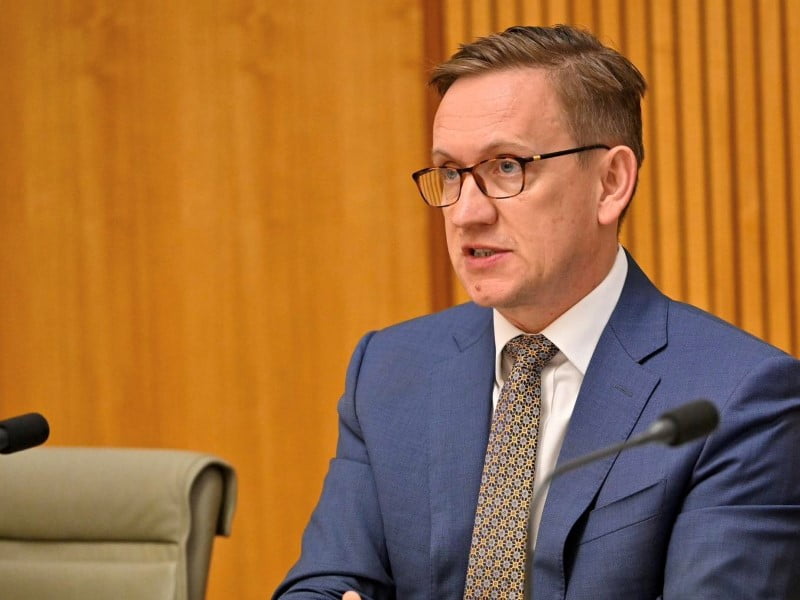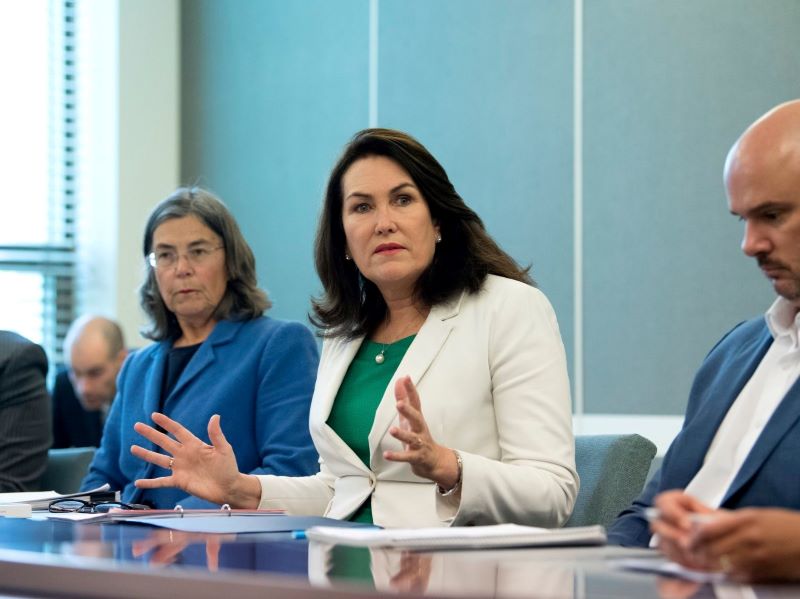A bevy of government tech projects, procurements and landmark legislation will go under the microscope in 2024, as the Albanese government pledges better outcomes in the last full year of its first term.
Early and important Senate inquiries will start looking at the upcoming $700 million digital ID scheme, as well as controversial changes to Defence trade controls from next month, while the Auditor-General has already started tabling audits.
Scrutiny will also be applied retroactively, with committees to rake over the failed visa platform upgrade, the Optus outage, and the expanded use of consultants in Canberra.

Senate to look at local tech sector
Independent Senator David Pocock landed the inquiry he had been seeking on the last sitting week of 2023, successfully referring an inquiry into the “sovereign capability in the Australian tech sector” to the Senate’s finance committee.
A vocal advocate for local firms, Senator Pocock is concerned multinationals are winning an unfair share of government work and often subcontracting to local firms anyway.
The inquiry will look at this, and whether the Albanese government’s ‘Buy Australia Plan’ is moving the needle for local tech suppliers.
Visa platforms resurface
Botched attempts to upgrade Australia’s visa processing systems will also be scrutinised by a committee, with the Julian Hill-led Audit Committee currently accepting submissions and expected to hold public hearings soon.
The inquiry is aimed at the most recent bungle of the so called Permissions Capability, which was scrapped last year with little to show from at least two years and $16.5 million of work.
Mr Hill is also keen to get to the bottom of the previous visa platform project and its multistage 2017 procurement that cost the government $92 million without ever landing on a final supplier.
Recently uncovered evidence has shown that potential supplier Infosys held 46 meetings with lobbyist and Scott Morrison ally Scott Briggs to discuss a bid, reigniting scrutiny of the project.
Synergy 360 scandal
The same Audit Committee will continue its inquiry into government contracts linked to controversial consulting firm and former minister Stuart Robert. The inquiry has already revealed a series of meetings between tech suppliers, the firm and Mr Robert in the lead up to lucrative procurement.
The committee has already asked the federal corruption watchdog to take a close look, but will continue its own inquiry from next week.
Consultants stay under the microscope
The Senate’s Finance and Public Administration References Committee is putting the finishing touches on its inquiry into the integrity of consultants, which have spread across the Australian Public Sector and now command billions of dollar every year.
The Committee’s work pried out details of the tax leaks scandal last year, triggering intense scrutiny of PwC and reforms to regulation and government procurement.
It’s report on the wider sector’s integrity and the increasingly cosy relationship with government is due in late March.

Digital idling
The Albanese government wants a national digital identity system up and running by July but will need to get the enabling legislation through the Senate and its Economics Legislation Committee.
The Committee will report next month on the legislation, which aims to beef up regulators and hand the government powers to expand the scheme to states and the private sector.
The inquiry has already heard amendments will be needed to stop law enforcement agencies from accessing its data.
With several One Nation and Coalition senators openly hostile to the idea of a digital identity system, the debate will get ugly.
AUKUS plan’s threat to local industry
Proposed changes to defence trade controls triggered by the AUKUS agreement and the Defence Strategic Review, will go under the microscope of the Senate’s Foreign Affairs, Defence and Trade Legislation Committee.
The controversial changes will remove licencing barriers for the three nations, but criminalise the sharing of information on certain military and dual use technologies with non-US or UK nations and individuals.
Some researchers and parts of industry have baled at the changes, warning they could see scientists jailed for their work, while markets and expertise could be shut off from local companies.

In a separate inquiry, the same committee will also continue probing the Department of Defence’s support for local industry.
An interim report has accepted longstanding complaints that Defence needs to be clearer in what it expects from local industry and noted newer concerns that the Australian government has not articulated what it means by ‘sovereign capability’.
It will now focus on procurement, ‘sovereign capability’, and innovation for a final report due by the end of March.
Optus fronts up
Optus executives will be asked to explain its massive outage last November to the Senate in hearings that continue next month.
Since the last hearing, the company has ditched its chief executive and been shown to have significantly under-reported the Triple Zero calls that could not get through on the day of the outage.
Senators are not happy with the telco and will table a final report on the outage by the end of February.
Research refresh
Generational reforms to the Australian Research Council, which administers more than $800 million in non-medical research grants every year will continue in early 2024.
The Senate’s Education and Employment Legislation Committee is reviewing a bill to bring in the changes recommended by a review of the agency last year.
Most notably, the bill will remove the veto powers of Education ministers that have allowed political interference in several research grants, with a new ARC board to take responsibility instead.
Stakeholders broadly welcome the changes but say the bill needs tweaking and should be accompanied by more funding for the agency.
Audits roll out
The Australian National Audit Office (ANAO) kicked off the new year with two audits of government tech projects.
A closer look at the procurement of the $1.2 billion SouthPAN system shows how eventual supplier Lockheed Martin leveraged earlier trials and opportunitiesv not available to its one competitor to help land the deal.
A review of the administration of the Parliamentary Expenses Management System (PEMS) showed poor planning and a lack of end user consideration allowed the project to go off the rails and blow out to more than $74 million.
The ANAO also plans on releasing audits this year on Defence’s procurement and implementation of the troubled myClearance system, the management of cyber incidents after a slew of high profile breaches, contract administration in Defence and how it is building local industry capability, the procurement of the “clunky” My Health Record system, and Defence’s management of ICT systems security authorisations.
The New South Wales Audit Office has listed several potential performance checks this year, including cyber security in local health districts and local government, the move to in house IT services known as GovConnect NSW, iCare and the state’s popular but not perfect Digital Restart Fund.
AI examination
Governments around the country will take a closer look at the impact of artificial intelligence in 2024 while outside experts come up with a plan on how to best regulate the technology nationally.
Industry minister Ed Husic has committed to mandatory rules for “high risk” AI but thresholds and definitions are yet to be decided and no deadline has been put in place.
The NSW Parliament is taking a broad look at AI and will hold public hearings in March, while South Australia is already considering the findings from its inquiry that backed calls for the development of a sovereign artificial intelligence capability.
Federally, an inquiry into the use of generative artificial intelligence in the Australian education system will resume with hearings in Sydney next week.







